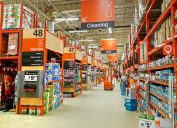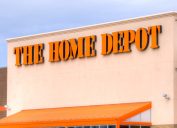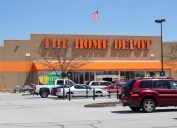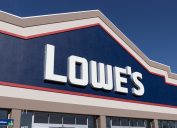Shoppers Are Still Abandoning Lowe's, New Data Shows—Here's Why
There were a few factors that contributed to a drop in sales last quarter.
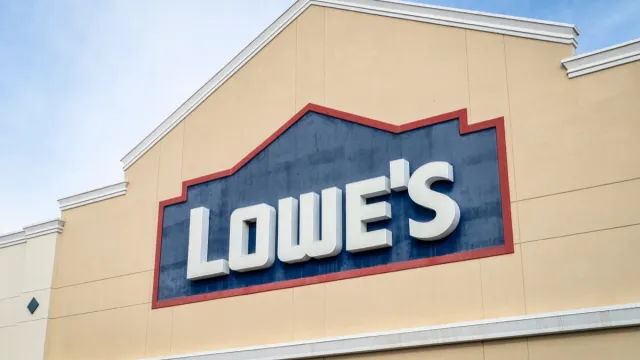
If you've cut back on spending recently, you're not alone. Grocery prices remain high, leaving many of us inclined to save extra cash for experiences, rather than spending it on big-ticket items or material goods. The home improvement sector has been directly influenced by this shift in focus following the COVID-19 pandemic, with big names like Home Depot and Lowe's both reporting dips in recent months. Now, new data shows that shoppers are still abandoning Lowe's. Read on to find out why sales dropped yet again.
RELATED: Shoppers Are Still Abandoning Home Depot, New Data Shows—Here's Why.
Sales slipped by 17 percent.
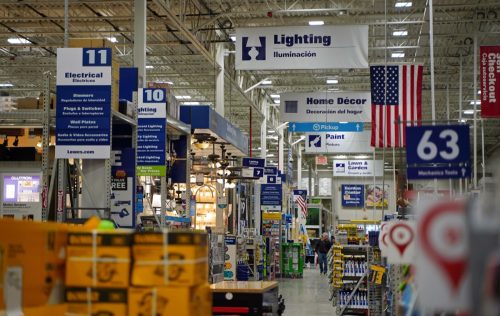
In a Feb. 27 press release, Lowe's reported results from the fourth quarter, with sales dipping to $18.6 billion. This was a 17 percent drop from the same quarter the year prior, where sales reached $22.4 billion. Comparable sales—which are adjusted for store openings and closings—also decreased by 6.2 percent, according to the press release.
However, even though sales were down, results were actually better than Wall Street predicted. Analysts expected sales to reach $18.47 billion, but sales bested that. Earnings per share were also higher than expected, coming in at $1.77 as opposed to $1.68.
RELATED: Lowe's Shoppers Threaten Boycott Over Self-Checkout: "I Will Shop at Home Depot."
Falling sales are the result of a few contributing factors.

In the press release, Marvin R. Ellison, Lowe's chairman, president, and CEO, attributed the sales decline to "continued pullback in DIY [do-it-yourself] spending."
Speaking with CNBC, Ellison said consumers continue to invest in experiences and are focusing less on DIY projects due to a decrease in housing turnover. Roughly two-thirds of homeowners are locked in at mortgage rates lower than 4 percent, Ellison said during the earnings call, which "may keep many on the sidelines" in terms of buying and selling.
Regarding the dip in comparable sales, the company noted the decrease in DIY, as well as "unfavorable January winter weather."
Ellison expanded on this during a Feb. 27 earnings call, dubbing January weather "harsh" and "extreme." He's not too far off in his statements either, as the National Weather Service did say last month was "full of extremes" temperature-wise, with slightly more snow than expected.
RELATED: 8 Things You Should Never Buy at Lowe's, Retail Experts Warn.
Appliance sales were impacted by spending habits.
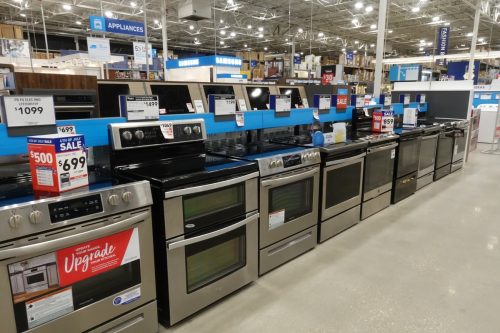
During the earnings call, Ellison also cited ongoing issues with big-ticket item sales, as consumers are focusing more on "value."
"Macroeconomic factors like persistent inflation and a stagnant housing market continue to make DIY customers and consumers hesitant to spend on big ticket purchases for their homes, and those who did engage in home improvement activities took on smaller non-discretionary projects with a heightened focus on value," Ellison said. "This impacted demand for bigger ticket interior categories like kitchen and bath, flooring, and appliances."
Instead of investing in a new "suite" for their kitchen, consumers will buy one big-ticket item like a dishwasher or a fridge, Ellison explained to CNBC. For the appliance sector of Lowe's business, Ellison said this new spending habit is actually "the biggest determining factor of our sales volume coming down."
Lowe's executives are optimistic, yet cautious about 2024.
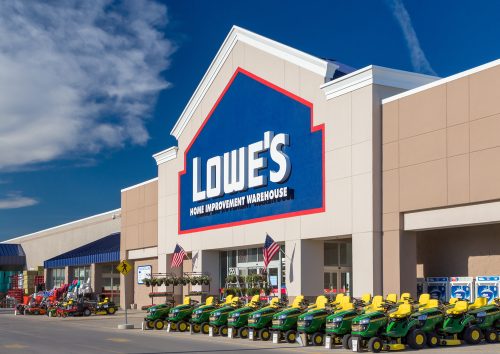
Looking forward, executives are proceeding with caution, but maintain a positive outlook. Considering current economic factors, the company is projecting sales between $84 and $85 billion, which is lower than the $86.3 billion earned in fiscal year 2023.
"As we look at 2024, we expect DIY demand to remain under pressure in the near term," Ellison told CNBC. "But we feel great about the medium- to long-term outlook for our business and candidly for the home improvement industry in general."
When mortgage rates come down, Ellison also anticipates that people will be more interested in home improvement products.
"When rates come down, that's going to spur housing turnover and you know what happens when you put the house on the market: You spruce up the paint. You may spruce up the yard. You'll do different projects around the house to get ready for sale and then when you buy a home, you do the same thing," he told CNBC.






